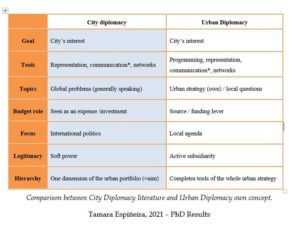The approval of the UN Urban Agenda and the European Urban Agenda in 2016 reveal the growing importance of cities all around the world. Moreover, at the international level, cities are speaking up for themselves and by themselves. It is clear in the different COPs and even more inside the European institutions.

© A “quintessential global city” – Paris, France. Stefano Baschenis – Shutterstock
Researchers like Benjamin Barber and Michele Acuto seem to echo, twenty years later, Sassen’s “Global Cities”: cities are becoming full-fledged actors in the international scene. The concept of “city diplomacy” recognises the “Foreign Policy of Cities,” developed by Simon Curtis. But what about urbanism and the cities themselves? Do cities just act local and think global or can they do the reverse – act global and think local?
This was my research question, the focus of my PhD Dissertation, which I successfully defended in January 2021. I also presented this work at a RSA #CPnet webinar last May during a session entitled “The Urban Dimension of Cohesion Policy” organised by professor Sonia de Gregorio. I was truly happy to get the opportunity to do so as Sonia’s work was key to building my arguments.

Figure 1 – A glimpse of my presentation in the RSA_CPNet webinar
Using grounded theory in a professional context
I have been working for almost twenty years in European Affairs, half of them leading an EU city network. Thus, as advised by my masters’ director, Dolores Riveiro, I decided to build on participatory observation in order to share my experience with European cities in an academic way. This was made through Grounded Theory (Glaser and Strauss), a method that allows to come from observations to theorisation of abstract concepts.

Figure 2 – Grounded Theory Iterations Leadings to Urban Diplomacy
As a complicated figure above, with several iterations, the final step is my conclusion on the link between urban planning and EU (international) action. Urban planning is the roadmap that determines the objectives and strategies of cities; also, at the EU scale. Therefore, in its development, urban planning may identify the most relevant EU instruments, the best schedule, and the most appropriate participation modes for EU opportunities; as well as the degree of involvement of the local authority in the Europeanization process. Thus, on the basis of strategic mechanisms such as active subsidiarity, local development moves to a foreground where European policies are a choice among other planning instruments and tools. Subsequently, my research identifies four types of instruments (programming, communication, representation and networking) that can enhance the goals of a local authority.
Consequently, European cities are moving from the European (or Europeanized) city to the “Europolitan city”, a city-government who develops its local policy also at the larger European scale, the concept I coined “urban diplomacy”.
Based on a planning focus: urban diplomacy sets local development as the starting ground and looks at cities’ EU activity from a territorial approach, as indicated by the Barca report. In sequence, once planning is defined and strategy is decided, any EU city of any country or size may be in position of taking an active role in EU governance through active subsidiarity as conceived by Pierre Calamé.
My PhD dissertation presents several study cases, with specific attention to URBACT cities such as Balatonfüred, Solna, Dresden or Obidos (whose example was crucial to determine capacity of cities around city planning and not size).
This new concept, urban diplomacy is the logical consequence of a continuous deepening of the empowerment of local authorities within the European Union, as well as the effect of such openness at the international level that this century has been declared to be that of cities. In the conclusion, the thesis also makes a clear differentiation of urban diplomacy (related to local planning) and city diplomacy (related to international policy).

Figure 3 – Differences between city and urban diplomacy
As a next step after my PhD, I intend to test the concept of urban diplomacy global level, where instruments like C40 programmes (City Finance, City Intelligence) are based on the very principle of urban diplomacy – providing cities with international instruments not available at regional/national levels.

Tamara Espiñeira (Twitter) currently holds a PhD in Geography and Spatial planning and has been working with local and regional authorities since 2004, both in EU and international affairs. She has held expert positions with EU institutions and published research on territorial cooperation and urban planning.
Are you currently involved with regional research, policy, and development? The Regional Studies Association is accepting articles for their online blog. For more information, contact the Blog Editor at rsablog@regionalstudies.org.